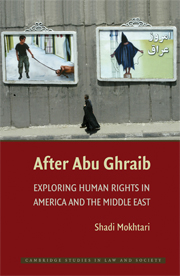Book contents
- Frontmatter
- Contents
- Acknowledgments
- Abbreviations
- Introduction
- ONE American Imaginings of Human Rights and the Middle East
- TWO The Human Rights Challenge from Within
- THREE The Middle Eastern Gaze on American Human Rights Commitments
- FOUR American Imprints and the Middle East's New Human Rights Landscape
- FIVE From the Ashes of the Post–September 11th Era: Lessons for the Human Rights Project
- Conclusion
- Bibliography
- Index
- CAMBRIDGE STUDIES IN LAW AND SOCIETY
- References
ONE - American Imaginings of Human Rights and the Middle East
Published online by Cambridge University Press: 12 September 2009
- Frontmatter
- Contents
- Acknowledgments
- Abbreviations
- Introduction
- ONE American Imaginings of Human Rights and the Middle East
- TWO The Human Rights Challenge from Within
- THREE The Middle Eastern Gaze on American Human Rights Commitments
- FOUR American Imprints and the Middle East's New Human Rights Landscape
- FIVE From the Ashes of the Post–September 11th Era: Lessons for the Human Rights Project
- Conclusion
- Bibliography
- Index
- CAMBRIDGE STUDIES IN LAW AND SOCIETY
- References
Summary
The post–September 11th era provided an extraordinarily lucid view of the many intersections of American power with human rights. Thus, it is only fitting to begin the book's analysis by laying out and linking the most power-laden aspects of American interactions with the human rights paradigm following September 11th. Although the chapter draws considerably from the host of invaluable reports, investigations, and articles dedicated to dissecting the American “road to Abu Ghraib,” its intent is not simply to recount the facts and legal formulations at the heart of the Bush administration's human rights practices and policies. Instead, it hopes to move the discussion further by incorporating two additional dimensions of the American treatment of human rights after September 11th. First, it seeks to shed light on the ways in which the East/West geography of human rights facilitated American power during the era. Second, it attempts to highlight the continuity of the Bush administration's legal, political, and ideological doctrines vis-à-vis human rights, with human rights's place in the American imagination prior to September 11th. Within the overall layout of the book, this chapter's positioning of American power serves as the backdrop to the various challenges and mobilizations against American post–September 11th human rights policies as well as the traditional operation of the East/West geography to be taken up in subsequent chapters.
HUMAN RIGHTS, POWER, AND PARADOX IN AMERICAN IDENTITY POLITICS
Throughout the United States' history, upholding individual rights and civil liberties has been a central tenet of dominant American identity constructions.
- Type
- Chapter
- Information
- After Abu GhraibExploring Human Rights in America and the Middle East, pp. 21 - 62Publisher: Cambridge University PressPrint publication year: 2009



